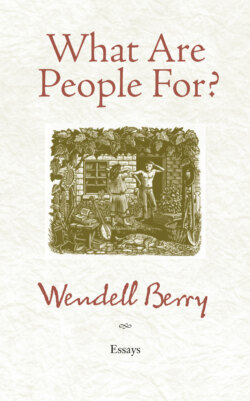Читать книгу What Are People For? - Wendell Berry - Страница 10
На сайте Литреса книга снята с продажи.
I
Оглавление“Nate Shaw” is the pseudonym of a black farmer born in Alabama in 1885. He grew up as a field hand and sharecropper in the cotton belt. Because of his industry, ambition, and intelligence, he prospered. By the early 1930s he owned a good team of mules, good farming equipment, two automobiles; his family was well cared for; he was on the way to owning an eighty-acre farm. At that time he joined the Sharecroppers Union. He took a stand against some sheriff’s deputies who had come to attach and carry off a neighbor’s stock. The confrontation ended in a “shootin frolic,” for which Nate Shaw was sent to prison for twelve years. He stayed the full term, refusing a parole bargain by which he would have had to leave his home country and move to Birmingham, and was released in 1945. Older, drastically reduced in means, he returned to farming, “a mule farmin man to the last,” though the tractor era had come in during his absence. In March of 1971 he began to tell his story to a young white man, Theodore Rosengarten. The telling, recorded on tapes, took 120 hours; the result, much edited, is this remarkable book. Our debt to Mr. Rosengarten is large.
It is a remarkable book because Nate Shaw was a remarkable man. And it is worthwhile to try to say exactly why he was remarkable. He was not remarkable because he belonged to “the tradition of farmer-storytellers.” Most farmers of Nate Shaw’s generation belonged to the tradition of farmer-storytellers, and I am sure that a great many of them were good talkers indeed. Nor is he remarkable for what Mr. Rosengarten calls his “awesome intellectual life.” The adjective seems to me overwrought, as if Mr. Rosengarten were trying to make Nate Shaw admirable, which is not necessary. With us, the phrase “intellectual life” suggests a life exclusively intellectual, a life apart from action, and Nate Shaw was remarkable because the life of his body and the life of his mind were one life. He had, obviously, a superior intelligence, but he was not a modern intellectual. His thought was not speculative or experimental; it was not an overrefined maundering among “alternatives.” It was a meditation upon experience, always related to acts.
Review of Theodore Rosengarten, All God’s Dangers: The Life of Nate Shaw, Alfred A. Knopf, 1974.
Shaw’s words have the energy of passionate knowledge; he speaks as a man who has seen. It is characteristic of him to say, “Well, I looked into all that and seed . . . ” He had no schooling; his book-learning is all described in one sentence: “I can put down on paper some little old figures but I can’t add em up.” But he says of the failure of his lawyer’s appeal, following his sentencing for the shooting: “That was my education right there—” In a sense, it must have been. That event—his stand against the deputies and his imprisonment—was not only the great event and the turning point of his life; it was also his life’s measure, its clarification or revelation. He speaks with the pressing awareness that “I understand a heap of things today more clear than I did in them days . . .” And sometimes his memories hasten and crowd him almost beyond coherence. He exclaims at one point: “O, these words brings up others and they won’t wait . . . ” His words are principled by his certainty that “there’s nothin honorable before God but the truth.”
I am troubled because Mr. Rosengarten’s name appears on the book as author rather than editor, which he was, and because the book is subtitled The Life of Nate Shaw rather than The Autobiography of Nate Shaw, which it is.
More troubling is the comparison of Shaw with Faulkner, initiated by Mr. Rosengarten in his preface and followed already by several reviewers. Mr. Rosengarten commits himself to this supposed likeness with a simple-mindedness hard to believe: “Faulkner writes about the white south; Shaw speaks about the black. Both focus on the impact of history on the family.” The first sentence falsifies Shaw and Faulkner both; if there is any single truth basic to southern history, it is that there never has been a “white south” or a “black south.” The second sentence is useless because, although it is at least partly true, it is probably just as true of most writers. The great difference between Shaw and Faulkner is passed over lightly indeed in the concession that one speaks and the other writes. That is a fundamental difference, and other important differences follow from that one.
The idea seems to be that until the blacks have their Faulkner they won’t be “equal”; Mr. Rosengarten’s sentences fairly sigh with relief. It is as if liberality requires us to pretend that the whites and the blacks are exactly alike in everything but color, like salt and pepper shakers. This could be agreed upon, maybe, and we could make an etiquette of ignoring our differences. But what if the differences do exist? And what if the two races are useful and necessary to each other because of their differences? And what if they have access to certain aspects of their experience and their common nationality only through each other? Shaw is valuable to us precisely because he is not like Faulkner. He is richly different.
